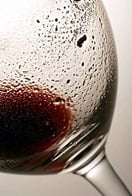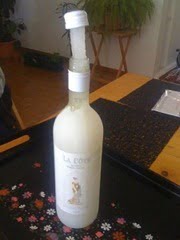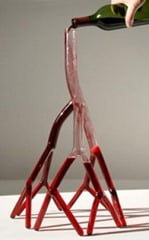Short Answers to the 5 Most Commonly Asked Wine Questions
April 5, 2011Should this wine be decanted?
Yes, it probably should.
I’m a big advocate for decanting / aerating, I try and do it as much as possible in my home; but then again I use a Soiree (saves washing-out a full decanter).
Generally speaking, full-bodied and aged-reds are the only wines which are nominated for promotion to the decanter; this in order to either remove it from its sediment, or to increase its surface area, therefore exposing it to more oxygen and giving it more room to “breathe”.
There are really no hard and fast rules when decanting wine, personally I say decant whatever and whenever you like! I’ve seen vintage Champagnes decanted, I’ve seen Alsatian whites decanted. All I know is that I can’t think of a single occasion where decanting / aerating would do any harm to a wine.
 Why is there sediment in my wine?
Why is there sediment in my wine?
Treat sediment as your best friend. Trust me.
Sediment is just tannins which bind together, and “fall out” of a wine. I take any sign of a gritty substance in the bottle as a sign of quality, and NOT cause for concern! For the most part, it means that a wine has gone through less intense (if any) fining or filtration, processes which some claim (including me) strips a wine of its character. This along the same lines as tartaric crystals (which is just cream of tartar and mainly found in white wines), a naturally occurring substance which looks like small “wine crystals”.
 How do you know which wines will improve with age?
How do you know which wines will improve with age?
I’ll let you into a secret: you don’t, no-one really does! Sure you can take an educated guess as to how a wine will progress as the years pass, but it will always be just that. A guess.
There are a number of different factors to bear in mind when deciding whether a wine has potential for aging, such as type of grape, acid and tannin levels, winemaking style and other viticultural practices. If you are wondering whether a wine has potential to age, consulting the winery’s own website is normally the best source of information. Some of the more cult-like Napa red wines and higher-end Bordeaux’s are normally the way forward for 5-10 year storage, but it’s still a very rocky road.
If you’re looking for truly long-term cellaring (over 10 years) Vintage Port, sticky dessert-style wines (i.e. Sauternes, Ice Wine or Muscat), or Sherry are some safe bets. Of course, all of this is pointless if you are buying wine from a retailer with bad wine storage in the first place, but that’s a whole other article …
 What is the correct temperature to serve wine at?
What is the correct temperature to serve wine at?
If you want to get pedantic about it (and I know you do), here’s a rough guide to wine serving temperatures:
Dessert wines (Sauternes-style): 43-47F
Rose and light bodied whites: 45-50F
Full-bodied whites: 50-55F
Sparkling: 50-55F
Light-bodied reds: 55F
Full-bodied reds: 59-64F
Ports: 54-61F
There are plenty of other guides out there which advocate a different temperature for every wine in the world, but that seems like a little overkill to me. You’re safe with the above reference.
 Why do some wines give me a headache?
Why do some wines give me a headache?
I get asked this a lot, and the problem is that research on what causes wine headaches is poor at best. One school of thought is that it could be the histamines, since histamines are in the skins of the grapes, and red wines spend time sitting on their skins to extract color, tannin, and flavor.
Personally I think a lot of it is to do with “user-error”. Either people drinking too much wine (if there is such a thing), drinking too much crappy-quality wine, or drinking it too quickly. Some sources think that wine headaches may be attributed to the cogeners, an impurity normally found in a lower quality wine, or in dark alcohols.
The one thing I do know is that it isn’t the sulfites, so you can get that out of your head right now!
My best piece of advice is to try and narrow-down which wines are causing the problem, and then avoid those specific wines, at least until research improves.











